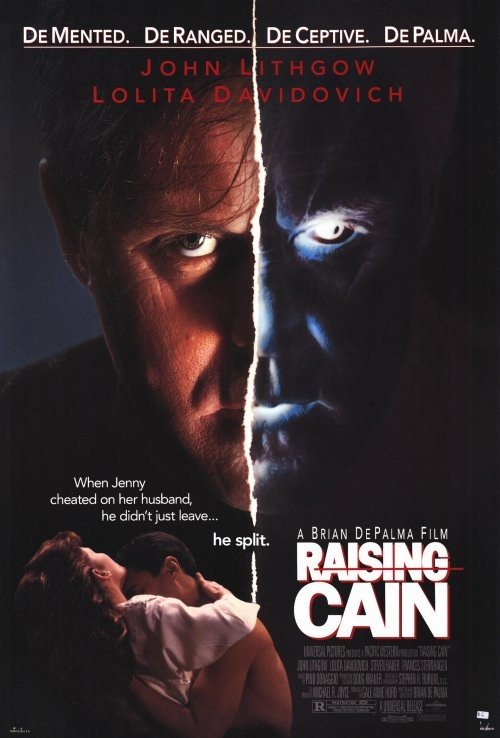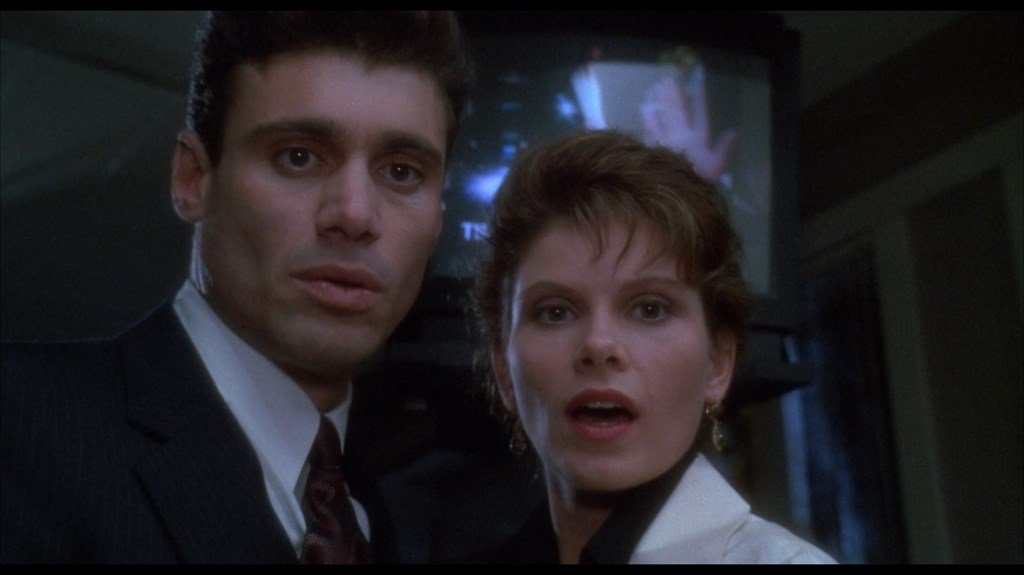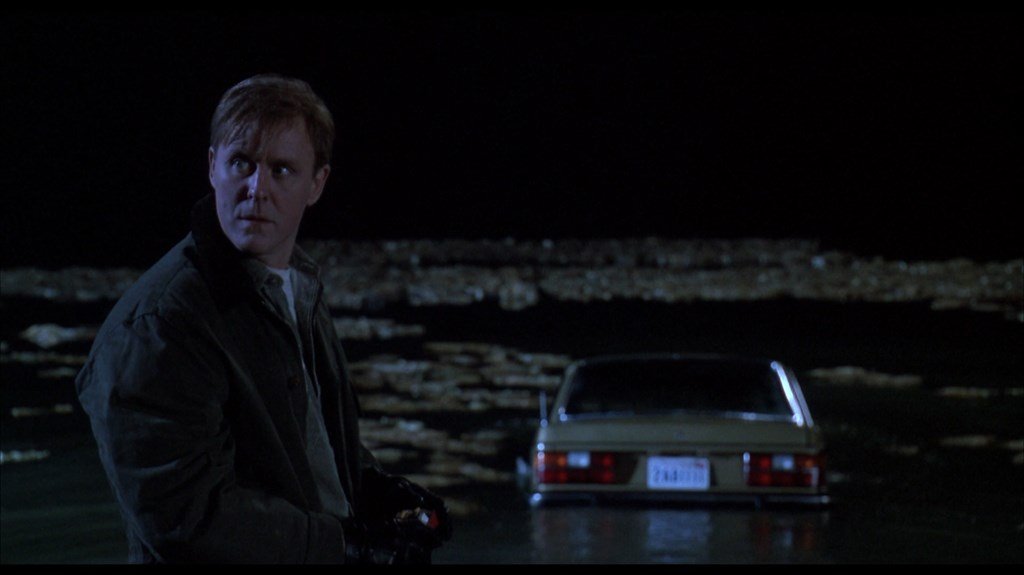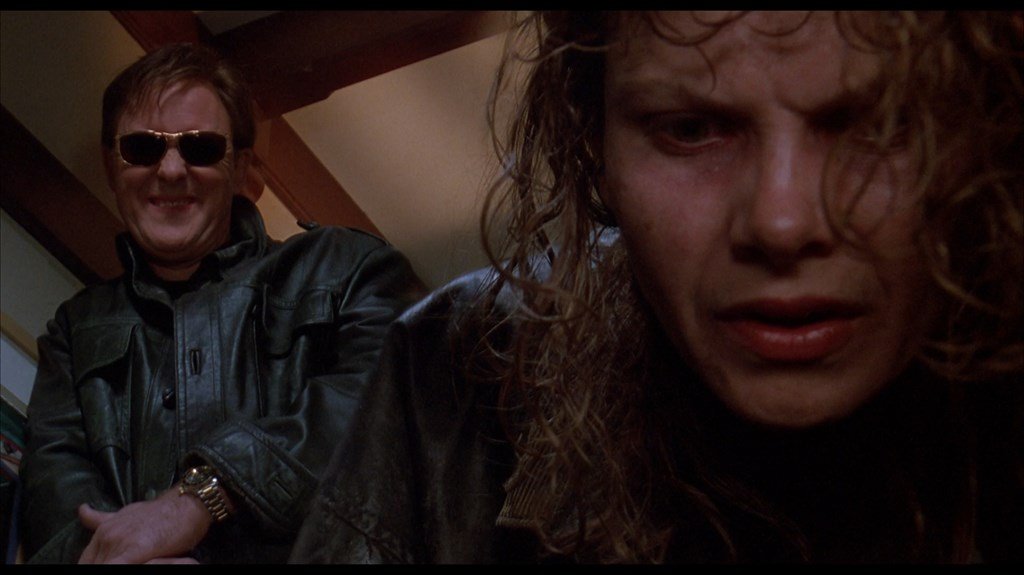RAISING CAIN: A New Split For DePalma's Multiple Madness
Fanedits have been quietly becoming an important part of film enthusiast culture over the last few years. Ever since frustrated Star Wars fans first used editing software to improve on The Phantom Menace, scores of film lovers have tried their hand at reworking a variety of different films to improve flawed works and bring out  new angles in familiar favorites.The fanedit achieved a new plateau recently when Brian DePalma publicly announced his support for a fanedit of his film Raising Cain, saying that it was closer to his original vision than the original edit he supervised for theatrical release. When one compares both versions, it's hard to argue with DePalma as the reworked version has a more pleasing, organic flow that makes it feel like his classic films.But first, a bit about Raising Cain for the novices: this intimately scaled thriller was originally released in 1992. DePalma also wrote the script, which focuses on the travails of a married medical professional couple. Jenny (Lolita Davidovich) is a doctor who is feeling alienated towards child psychologist hubby Carter (John Lithgow), who has grown obsessive about the care of their toddler-age daughter. She also finds herself drawn to Jack (Steven Bauer), the widow of a former patient who carries a torch for her.However, there's more than domestic drama here. Carter has been drawn into a plot to kidnap several children for experiments by his abusive experimental psychologist dad (also Lithgow). Even worse, Carter's nasty brother Cain (Lithgow yet again) has turned up to help. That said, the events play out in a way that suggests Carter, whose childhood history includes repressed abuse, may be imagining his conspirators. Meanwhile, kids are disappearing, including Carter and Jenny's daughter...
new angles in familiar favorites.The fanedit achieved a new plateau recently when Brian DePalma publicly announced his support for a fanedit of his film Raising Cain, saying that it was closer to his original vision than the original edit he supervised for theatrical release. When one compares both versions, it's hard to argue with DePalma as the reworked version has a more pleasing, organic flow that makes it feel like his classic films.But first, a bit about Raising Cain for the novices: this intimately scaled thriller was originally released in 1992. DePalma also wrote the script, which focuses on the travails of a married medical professional couple. Jenny (Lolita Davidovich) is a doctor who is feeling alienated towards child psychologist hubby Carter (John Lithgow), who has grown obsessive about the care of their toddler-age daughter. She also finds herself drawn to Jack (Steven Bauer), the widow of a former patient who carries a torch for her.However, there's more than domestic drama here. Carter has been drawn into a plot to kidnap several children for experiments by his abusive experimental psychologist dad (also Lithgow). Even worse, Carter's nasty brother Cain (Lithgow yet again) has turned up to help. That said, the events play out in a way that suggests Carter, whose childhood history includes repressed abuse, may be imagining his conspirators. Meanwhile, kids are disappearing, including Carter and Jenny's daughter... In its original version, Raising Cain was very divisive amongst fans and critics alike. DePalma radically reshuffled the story beats at the last minute before the film's release, resulting in a film that played like a series of Chinese puzzle boxes being opened before the viewer. Every time viewers got a hold on the plot, it was reinvented in a way that often contradicted what they thought they knew. People either took it as a charmingly campy bit of postmodern celluloid trickery or a muddled, tonally schizoid mess that didn't play fair with viewers.Twenty years later, European filmmaker Peet Gelderblom recut the film using an old DVD and some editing software, drawing on a structure derived from an early draft of the DePalma script. Gelderblom's edit is devoted to reordering events rather than doing a lot of tinkering or recutting within scenes and the results give the film a new, more cohesive feel. The shifts in perspective feel less forced and abrupt: though the structure remains tricky in how it cuts back and forth in time, there's a new logic to these movements that makes them feel consciously designed instead of artificial.
In its original version, Raising Cain was very divisive amongst fans and critics alike. DePalma radically reshuffled the story beats at the last minute before the film's release, resulting in a film that played like a series of Chinese puzzle boxes being opened before the viewer. Every time viewers got a hold on the plot, it was reinvented in a way that often contradicted what they thought they knew. People either took it as a charmingly campy bit of postmodern celluloid trickery or a muddled, tonally schizoid mess that didn't play fair with viewers.Twenty years later, European filmmaker Peet Gelderblom recut the film using an old DVD and some editing software, drawing on a structure derived from an early draft of the DePalma script. Gelderblom's edit is devoted to reordering events rather than doing a lot of tinkering or recutting within scenes and the results give the film a new, more cohesive feel. The shifts in perspective feel less forced and abrupt: though the structure remains tricky in how it cuts back and forth in time, there's a new logic to these movements that makes them feel consciously designed instead of artificial. The improved structure in the re-edit also makes it possible to appreciate the elegance of DePalma's craftsmanship. Using veteran collaborators like composer Pino Donaggio and cinematographer Stephen Burum, DePalma offsets his familiar Hitchcockian references with a mixture of noirish atmospherics and playfulness in how he satirically comments on the dangers of distracted parenting (this film must set a record for scenes of abandoned, in-peril toddlers). Fantastic setpieces like a wildly elaborate tracking shot through a police station and Rube Goldbergian standoff finale that uses three levels of a motel shine brighter in the more confident and coherent setting they get here.It's also worth noting that the performances feel stronger in this newly realigned context. Lithgow has a ball in either version getting play to variety of personas that grow ever campier but they work better in the fanedit because it gradually trots them out in a way that allows the audience to grow accustomed to the increasing flights of fancy. Davidovich and Bauer's work gets more focus in the early section of the fanedit and they come off more sympathetic and accessible as a result.
The improved structure in the re-edit also makes it possible to appreciate the elegance of DePalma's craftsmanship. Using veteran collaborators like composer Pino Donaggio and cinematographer Stephen Burum, DePalma offsets his familiar Hitchcockian references with a mixture of noirish atmospherics and playfulness in how he satirically comments on the dangers of distracted parenting (this film must set a record for scenes of abandoned, in-peril toddlers). Fantastic setpieces like a wildly elaborate tracking shot through a police station and Rube Goldbergian standoff finale that uses three levels of a motel shine brighter in the more confident and coherent setting they get here.It's also worth noting that the performances feel stronger in this newly realigned context. Lithgow has a ball in either version getting play to variety of personas that grow ever campier but they work better in the fanedit because it gradually trots them out in a way that allows the audience to grow accustomed to the increasing flights of fancy. Davidovich and Bauer's work gets more focus in the early section of the fanedit and they come off more sympathetic and accessible as a result. In either version, one can enjoy scene stealing bits from Gregg Henry and Tom Bower as a pair of cynical detectives and especially Frances Sternhagen as a psychologist who delivers some Psycho-inspired exposition. She has to do most of it in the aforementioned lengthy tracking shot and deserves big credit for pulling off several pages of dialogue without a hitch.Simply put, the fanedit of Raising Cain is revelatory affair that makes it possible to appreciate one of DePalma's more underrated works on multiple new levels. If you're a fan of the director, it is required viewing.
In either version, one can enjoy scene stealing bits from Gregg Henry and Tom Bower as a pair of cynical detectives and especially Frances Sternhagen as a psychologist who delivers some Psycho-inspired exposition. She has to do most of it in the aforementioned lengthy tracking shot and deserves big credit for pulling off several pages of dialogue without a hitch.Simply put, the fanedit of Raising Cain is revelatory affair that makes it possible to appreciate one of DePalma's more underrated works on multiple new levels. If you're a fan of the director, it is required viewing.


